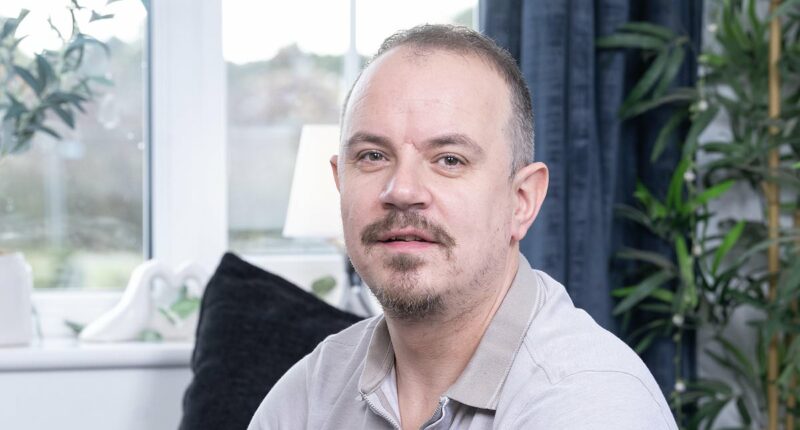Share this @internewscast.com
Oliver Bradshaw, a mental health professional, was accompanying a group of patients on a Halloween excursion in Nottingham when an unforeseen incident occurred involving one of his charges. While ensuring that a patient navigating a maze didn’t lose their way, Oliver encountered a severe accident.
A large PA speaker unexpectedly toppled, striking Oliver on the head. This unfortunate event resulted in him sustaining a brain contusion, essentially a bruise on the brain, which led to a concussion—a common outcome in such cases.
Oliver was quickly admitted to the hospital, spending two days in the Accident & Emergency department before being transferred to the neurosurgery unit at Queen’s Medical Centre, where he remained for an additional five days.
Upon his release from the hospital, Oliver struggled to return to normalcy. He grappled with persistent headaches and vision issues, feeling far from his usual self.
“I felt terrible,” recalls Oliver, who was 32 years old at the time and residing in Derby.
“My vision was blurred, and I saw an aura resembling a zig-zag pattern. My head was in constant pain, and I felt disconnected from my surroundings, as if I had mentally checked out,” he explained.
‘I’d had CT scans of my head, but nothing untoward showed up.’
As well as the ‘head’ symptoms he had heart palpitations and his pulse rate once went up to 200 (a normal reading is 60 to 100).
Over the next three months, Oliver’s symptoms worsened, and the dissociation became so acute that, combined with very low energy, he couldn’t even work out how to clean or cook.
‘I had severe brain fog, I felt like a car with no petrol – lifeless, apathetic and depressed,’ he says.

Oliver Bradshaw from Alvaston, Derbyshire, developed depression, chronic fatigue, loss of libido, weight gain and suicidal thoughts
He also started to feel angry – which was out of character – and in March 2020, six months after his brain injury, he was referred by his GP to a rehabilitation team at the local hospital.
‘The first consultant I saw dismissed me with “You’re fine”,’ he recalls. ‘Over the next few months I saw so many doctors and specialists, some privately and others on the NHS, including a neurologist.
‘I was suspected to have lupus [a connective tissue disorder], or fibromyalgia because of my extreme fatigue, or chronic fatigue syndrome – but most just told me I was OK. I was made to feel like a malingerer.’
Oliver became so depressed he tried to take his own life three times. ‘I couldn’t see an end to it,’ he told Good Health. ‘One GP said to me irritably I’d had more appointments and treatments than any other patient.’
Three years after his brain injury, in 2022, he was admitted to a psychiatric ward and put on medication for bipolar disorder.
In fact, Oliver had post-traumatic hypopituitarism (PTHP), caused by damage to the pituitary gland, which sits at the end of a narrow stalk just behind the nose.
Trauma to the head, such as a blow or after a fall, can damage the stalk (which supplies blood to the gland) causing it to stretch or tear – or the gland itself reverberates inside the skull.
PTHP can also, more rarely, be the result of a tumour, damage from surgery or radiation therapy, or problems with blood supply to the gland (which can be caused by blood-thinning medication), according to The Pituitary Foundation, a support organisation.
The pituitary is a master gland, controlling all our body’s vital hormones.
If it’s damaged, this can cause imbalances that lead to weight gain or loss, chronic fatigue, premature ageing, muscle loss, loss of libido, infertility, impotence and other symptoms, depending on the hormones affected.

Oliver had post-traumatic hypopituitarism (PTHP), caused by damage to the pituitary gland, which sits at the end of a narrow stalk just behind the nose
Depression is common. A study of almost 6,000 people in Taiwan in 2022 found that those with hypopituitarism (where the pituitary gland doesn’t make some hormones or not enough) were around three times more likely to develop depression.
About 24,000 cases of PTHP are diagnosed a year in England, although some experts say the number affected is much higher.
Unaware of the true cause of his symptoms, Oliver spent more than £15,000 on private healthcare and treatments, including brain stimulation to calm his mood. But nothing helped.
‘I was 35, but felt 55,’ he says. ‘My libido was dead, my face had changed shape, my 5ft 11in frame had put on a huge amount of weight – going up to 15st from my normal 11st, and my hair was thinning. Every single morning I woke up feeling angry. My memory was so poor I thought I had early dementia.’
Then last year, Oliver Googled his symptoms and came across a feature on PTHP published in the Daily Mail in 2019 – a discovery that changed his life.
‘If I hadn’t seen it, I don’t think I’d be alive,’ he says.
A simple blood test at a private clinic at Cheadle Royal Hospital in Cheshire revealed that Oliver was severely deficient in growth hormone (symptoms include weight gain and hair loss) and low in testosterone.
‘There is increasing awareness that various hormone deficiencies can follow trauma to the head, and these are not always readily identified, especially growth hormone deficiency,’ says Ashley Grossman, a professor of neuroendocrinology at Barts and the London School of Medicine.
‘A lack of awareness of this and its possible treatment can lead to a patient suffering increasing fatigue and depression, and even to suicide.’
The consequences of growth hormone deficiency can be devastating but they are also easily treated. Oliver started growth hormone replacement therapy nine months ago and is also now taking statins for high cholesterol and pills for high blood pressure (common PTHP symptoms).
He says he has to pace himself, but feels much improved – he’s also lost weight and has returned to work part-time, and says he’s even thinking about dating again.
Dr Tara Kearney, a consultant endocrinologist who spotted Oliver’s PTHP, says that although more people are being diagnosed, doctors’ knowledge of the condition is still ‘sketchy’ and symptoms are often assumed to be the result of brain damage, rather than a hormone imbalance.
The pituitary is damaged in an estimated 10-20 per cent of people with head injuries, including concussion, says Dr Kearney.

Dr Tara Kearney, a consultant endocrinologist who spotted Oliver’s PTHP
But just because someone has had concussion, it doesn’t mean they will get PTHP, she adds: ‘I have seen PTHP after a relatively minor bang to the head, and have also seen people survive catastrophic head injuries and retain normal pituitary function.
‘When doctors see someone who has had a head injury, who is trying to thrive in life but feels something is holding them back, it is important not to rule out PTHP,’ says Dr Kearney.
‘This is especially important if the patient has gained weight, particularly round their middle – a common symptom of growth hormone and testosterone deficiency – has muscle wasting, sexual dysfunction and poor memory and concentration.
‘In their first year after a head injury, hormones will fluctuate. But after a year, if things haven’t returned to normal, doctors should be thinking about hormone problems.
‘Attempts at suicide, when someone gets so frustrated at not being able to get on in life, are a very big red flag. PTHP needs to be more on the radar after any head injury.’
Joanna Lane has long campaigned to raise awareness of the condition that she says drove her 31-year-old son Christopher to suicide in 2008.
He’d fallen out of a tree and was hospitalised with concussion aged seven. He later developed a testosterone deficiency, so couldn’t sustain an erection.
Joanna only learned about this after his death when she came across a distressing letter he’d written to his girlfriend.
‘We have come a long way, but PTHP still isn’t as widely recognised as it needs to be,’ says Joanna, who set up a charity in her son’s name to support patients.
‘The NHS A-to-Z of health conditions makes no mention of a condition that, if untreated, can make people want to kill themselves. It doesn’t make any sense.’
Joanna, who has persuaded the NHS to mention the possibility of pituitary gland damage on discharge leaflets for patients leaving hospital after a brain injury, believes there are thousands with undiagnosed PTHP living very limited lives, with no idea what is wrong with them.
‘If you have had a head injury and recognise any of the symptoms mentioned in this piece, please ask your doctor for endocrine testing,’ she says.
‘If Chris had been given access to a simple test and given hormone therapy, he would almost certainly be alive today.’
Oliver adds: ‘I still get angry when I think that all that was needed was a simple blood test to diagnose what was actually wrong with me.
‘I was made to feel like a malingerer who was wasting valuable resources. There really needs to be better awareness of PTHP.’
For confidential support, call the Samaritans on 116 123, or visit samaritans.org

















